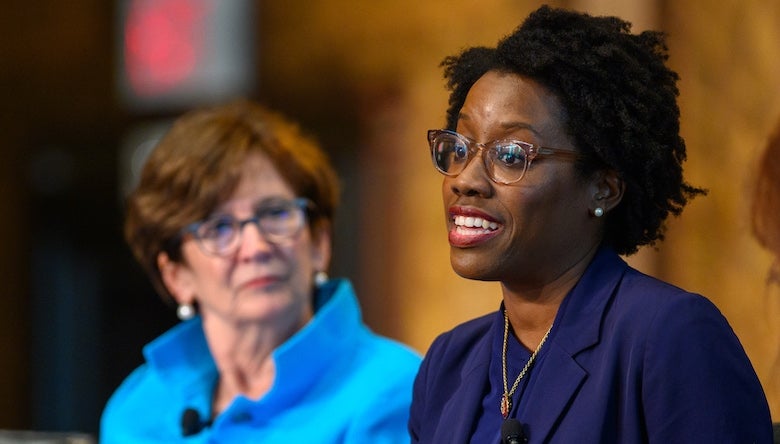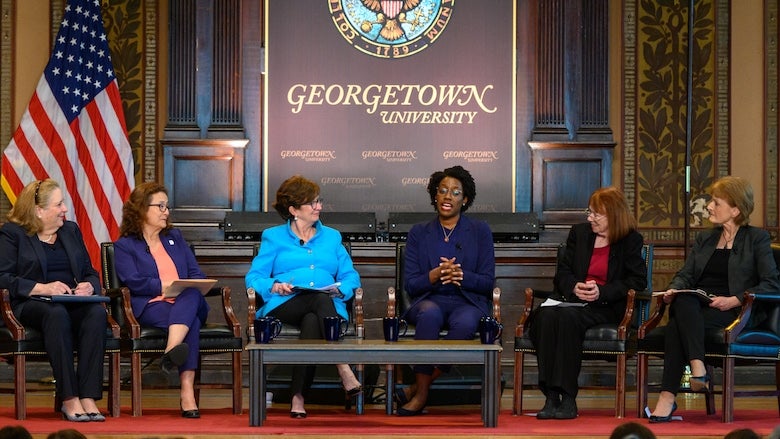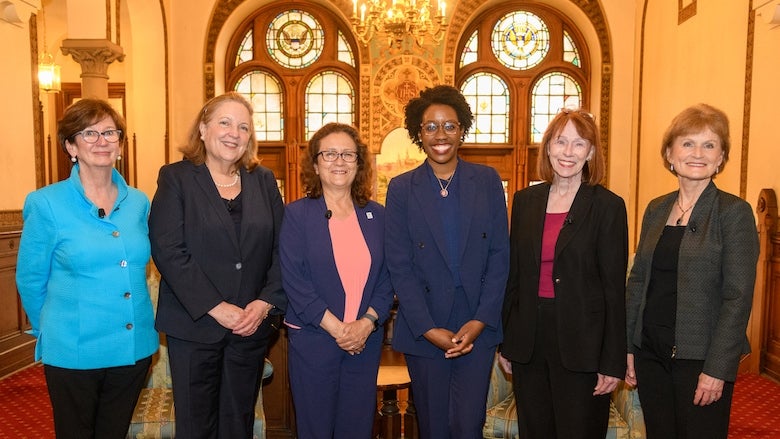Congresswoman Underwood Speaks on Georgetown Panel Celebrating Nursing

Congresswoman Lauren Underwood (IL-14) speaks during the panel discussion at Georgetown, and Dean Patricia Cloonan listens to her remarks.
May 1, 2019 – A panel, hosted yesterday by the School of Nursing & Health Studies, featured several prominent nurses, including Congresswoman Lauren Underwood (IL-14), for a discussion about the profession.
Underwood, a one-time faculty member in Georgetown’s master’s-level nursing program, called on the audience in Gaston Hall to be active in the world of policy.
“Many of us are so comfortable advocating for our patients,” Underwood said. “We’re so comfortable advocating for our communities. But we don’t often advocate for ourselves – and certainly not on Capitol Hill. And so it was a real honor in my career to be able to teach in a program here [at Georgetown] that taught nurses how to do this.”
Many of us are so comfortable advocating for our patients. We’re so comfortable advocating for our communities. But we don’t often advocate for ourselves – and certainly not on Capitol Hill.
Congresswoman Lauren Underwood (IL-14)
Celebrating Nurses
“It’s up to us, right,” she added. “If we want to see some advancements for our profession, we have to be willing to do the work. So, I am going to encourage all of you to think about what you can do to help our profession move forward in that way.”
Dr. Patricia Cloonan, dean of the School of Nursing & Health Studies, moderated the panel that included Underwood and several distinguished nurse leaders:
- Eileen Brennan Ferrell (NHS’75, G’83), senior vice president and CNO at MedStar Georgetown University Hospital
- Maria Gomez (NHS’77), founder, president, and CEO at Mary’s Center
- Dr. Patricia Grady (NHS’66), director emerita of the National Institute of Nursing Research
- Dr. Mary Wakefield, who served as acting deputy secretary of HHS and administrator of the Health Resources and Services Administration in the Obama administration.
Gomez, Grady, and Wakefield are also visiting distinguished professors at the School of Nursing & Health Studies, and Ferrell serves on the school’s Board of Advisors.
“As we head toward National Nurses Week [May 6-12], we really are just delighted to welcome you to Georgetown for this celebration of nursing,” Cloonan said. “. . . It is really a humbling experience for us to begin to think about ways in which we engage together to advance the profession that we all love.”

The panelists in Gaston Hall, pictured left to right: Eileen Brennan Ferrell, Maria Gomez, Dr. Patricia Cloonan, Congresswoman Lauren Underwood (IL-14), Dr. Patricia Grady, and Dr. Mary Wakefield.
‘Changed My Life’
Underwood, a member of the Democratic party, made U.S. House of Representatives history at her swearing in, becoming the youngest African American woman to serve in the chamber.
She spoke about her early experience in local government, path to nursing, college-level internships with then-Illinois Senator Barack Obama and the CDC, and decision to pursue elected office.
“Second semester freshman year at 8 am on a Monday, we had this honors course, ‘Policy and Politics in Nursing and Health Care,’” Underwood remembered about her undergraduate years at the University of Michigan. “No one was excited about it except for me,” she joked to audience laughter.
“That class changed my life because I found out about a field called health policy where I was able to combine my clinical interest and this government interest and knew that I could have a whole career in that area,” she added.

From left to right: Dr. Patricia Cloonan, Eileen Brennan Ferrell, Maria Gomez, Congresswoman Lauren Underwood (IL-14), Dr. Patricia Grady, and Dr. Mary Wakefield.
Health Care: ‘Number One Issue’
Underwood, who earned master’s degrees at Johns Hopkins University and went on to serve as a senior advisor at the U.S. Department of Health and Human Services (HHS) where she worked on the Affordable Care Act, is a member of the 116th United States Congress. She represents the 14th Congressional district of Illinois.
At the Georgetown event, Underwood reflected on her own victory in 2018.
“Health care ended up being the number one issue in our election,” she said. “To the question about . . . ‘what does the agenda look like,’ I think health care is at the very top of our national policy agenda.”
“I believe health care is a human right,” she added. “That’s been foundational to my nursing practice.”
‘Most Trusted Component’
The nurse leaders on the panel reflected on key issues from their respective domains, including developments and needs in acute care delivery settings, crucial partnership-building in ensuring the health of the community, the contributions of nurses to important research discoveries, and the translation of clinical expertise and evidence into the policy arena.
“Nurses compose the largest and most trusted component of the health care team, and they are trained to do research and to improve clinical care and policy,” said Grady, echoing Underwood’s call for nurse involvement.
“Obviously, nurses play a critical role in health care,” Wakefield noted. “We have a lot going on, as Congresswoman Underwood indicated, in the health policy arena that very much shapes what happens to patients, what happens to their families, what happens to entire communities. And I would say one of our highest priorities right now is to ensure that the work that nurses do embraces engagement in health policy.”
Gomez illuminated the ways nurses are involved in innovations in technology and the pharmaceutical industry. “Nurses would be perfect as innovators of technology,” she said. “We have researchers that come and want to try a new gadget, and they want to know . . . whether it works on a community. Nurses can actually talk about the affordability, the accessibility, and the cultural competence of those technologies for those individuals.”
And Ferrell described how the hospital, which recruits “nurses from around the nation,” encourages them to be involved in policy. “We actually, as a Magnet hospital, have a very, very detailed shared governance program, which includes a legislative council,” she said.
“Capitol Hill is down the street,” she said, noting the framing question and the goal: “How can we make change?”
